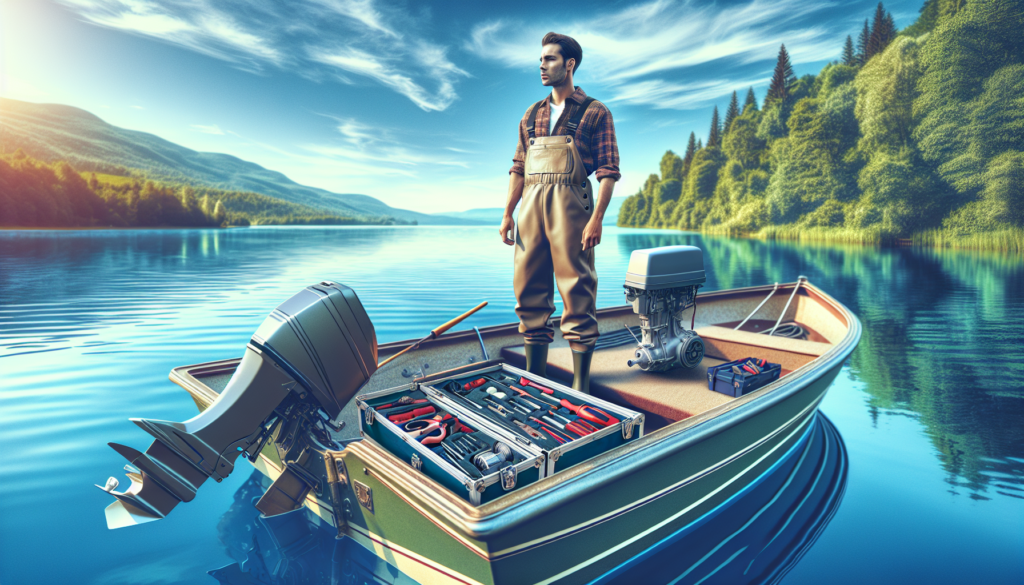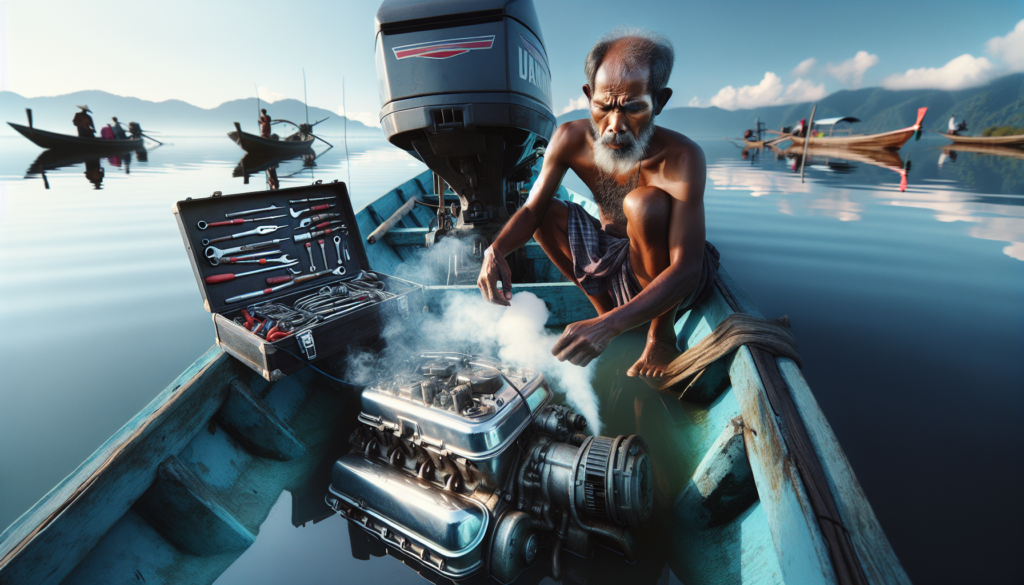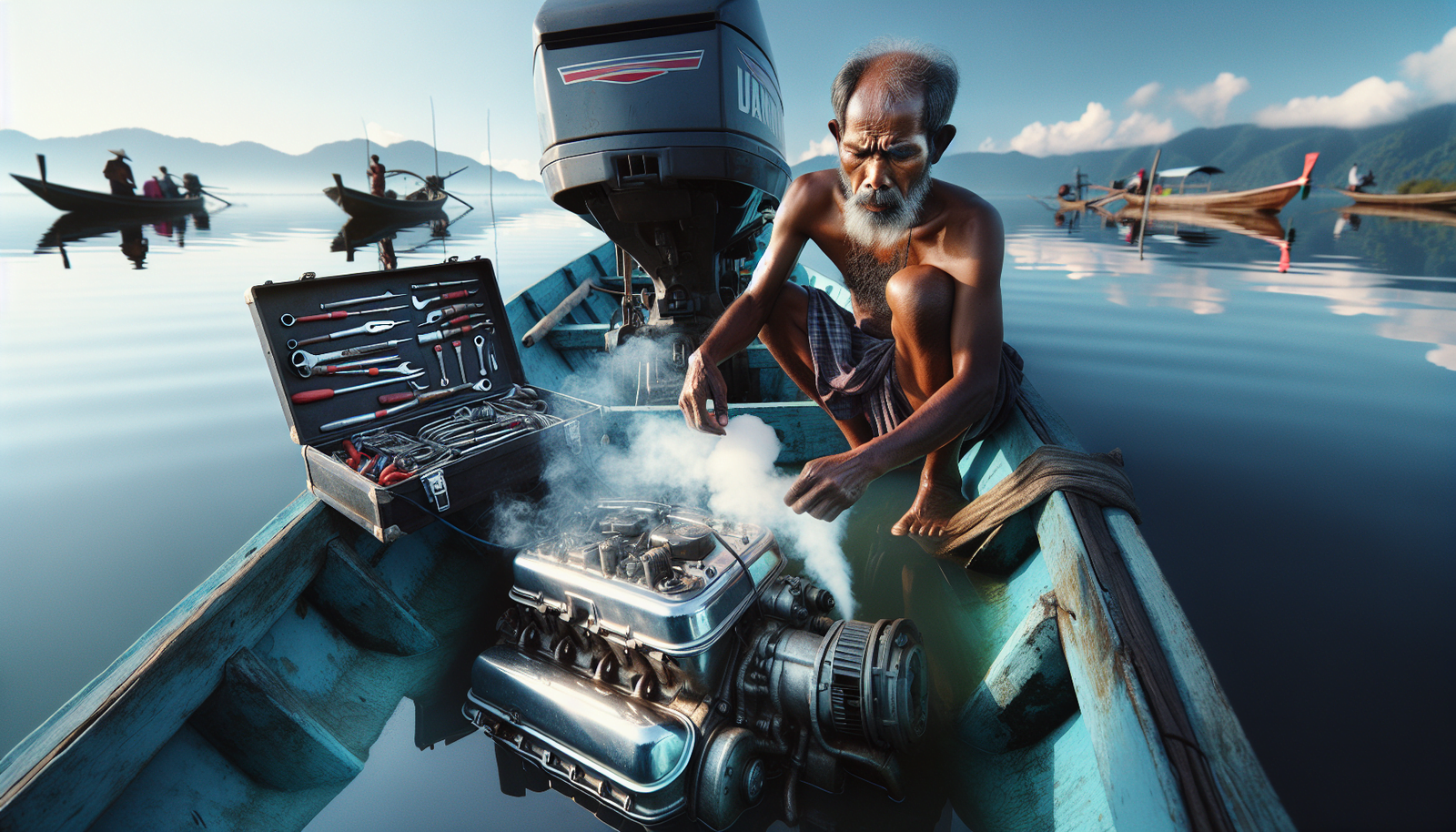You’re out on the water, away from the hustle and bustle of city life, and all you want to do is enjoy a tranquil day of fishing. Suddenly, your boat’s engine sputters and dies. Pesky boat engine problems can ruin any fishing trip, but don’t let that discourage you. The article “How To Troubleshoot Common Boat Engine Problems While Fishing” is here to guide you. This piece is designed to arm you with essential knowledge on identifying common boat engine issues and tackling them head on. Instead of being stranded at sea, you’ll be back to casting your line in no time. So, prepare yourself to learn some useful tips and tricks to keep your engine purring and your spirits high.
Identifying Common Boat Engine Problems
You’ve probably experienced this: you’re out on the water, ready to cast your line, and suddenly your boat engine sputters to a stop. Don’t let engine trouble ruin your day of fishing. If you know how to identify common boat engine problems, you can potentially save yourself from an unfortunate situation and get your vessel up and running in no time.
Recognising signs of engine trouble
The first step in troubleshooting is learning to recognise the signs of engine trouble. Odd noises, excessive vibration, trouble starting or keeping the engine running, overheating, loss of power, and difficulty shifting gears – these are all warnings of potential engine issues. Being vigilant and identifying these signs early can prevent major engine damage and cost less in terms of time and money.
Different types of common boat engine issues
There are several types of common boat engine issues. Dead batteries, bad fuel, faulty spark plugs or ignition switches, overheating due to cooling system issues, blocked fuel lines, damaged impeller or thermostat are just a few of them. Learning about these issues helps you understand the kind of problems you may encounter when on the water.
How fishing impacts boat engine performance
An often overlooked factor that affects boat engine performance is fishing. You might be wondering what fishing has to do with your boat’s engine. Well, idling for long periods while fishing can cause your engine to run too cool, which can lead to problems such as fouling plugs and carbon buildup. Also, trailing fishing lines can potentially get tangled in your propeller, causing problems with the drive train and power.
Troubleshooting Engine Won’t Start
One dreaded problem is when your boat engine refuses to start. Let’s have a look at the typical reasons why this might happen and suggestions for possible solutions.
Inspecting battery connections
First things first, check the battery. Loose or corroded connections can prevent the engine from starting. Tighten the connections if loose, and clean any corrosion with a mixture of baking soda and water.
Evaluating fuel system
Next, check the fuel system. Make sure there’s enough gas in the tank and the fuel is fresh. Old, stale fuel can cause engine problems. Additionally, inspect for any leaks in the fuel lines.
Checking spark plugs
Another common culprit are the spark plugs. Are they clean and correctly gapped? Or are they fouled or damaged? In the latter case, they might need a replacement.
Examining safety lanyard
Also check the safety lanyard or kill switch. If it’s not correctly attached, your engine won’t start.
Looking for faulty ignition switch
Lastly, inspect the ignition switch. These can wear out over time and need to be replaced.

Dealing With Engine Overheating
An overheating engine can lead to serious damage. Here’s how you can deal with this problem.
Examining water cooling system
The first thing you’ll want to look at is the water cooling system. Make sure the intake isn’t clogged with debris and the water pump is working effectively.
Checking the thermostat
The thermostat, which regulates coolant flow, could also be at fault. If it’s not opening properly, it could cause the engine to overheat.
Inspecting impeller for damage
The impeller, another part of the cooling system, can also be responsible. Check whether it’s damaged or has worn blades, and replace it if necessary.
Evaluating heat exchanger
Lastly, take a look at the heat exchanger. If it’s clogged or corroded, it may not be removing enough heat from the cooling system, causing the engine to overheat.
Addressing Engine Stall Issues
Engine stalling is an annoying issue that can quickly ruin your day on the water. Let’s go through how to address this problem.
Checking fuel supply
Ensure there is enough fuel in the tank and that fuel is reaching the engine. A blockage or air leak in the fuel line could restrict fuel flow and cause the engine to stall.
Looking for dirty or clogged filters
Just as our lungs need clean air to function effectively, an engine needs clean fuel and air too. Dirty or clogged filters can cause an engine to stall.
Inspecting spark plugs
As before, faulty spark plugs can be a culprit in an engine stall, so be sure to check them.
Examining fuel lines for obstruction
Look for any obstructions in the fuel lines. Debris or deposits can clog the fuel lines and starve the engine of fuel, causing it to stall.

Stabilising Engine Vibration or Noise
Excessive vibration or noise can be a sign of potential problems in your boat engine. Let’s see how you can stabilize this.
Analysing engine belts
Check the engine belts. A loose, worn, or torn belt can cause vibration or noise.
Checking motor mounts
Also observe the motor mounts. If they’re worn or broken, they need to be replaced. They are critical for maintaining engine alignment and reducing vibration.
Inspecting transmission
A misaligned or malfunctioning transmission can also cause vibration or noise. Inspect it for any problems.
Evaluating propeller for damage
Lastly, examine the propeller. A bent or damaged propeller can create a lot of vibration, potentially leading to further damage.
Fixing Engine Power Loss
Loss of power can be distressing when you’re out on the water. Here are some tips to diagnose and address this issue.
Inspecting fuel system
Just like with engine stalling, check the fuel supply and fuel system first.
Evaluating ignition system
A problem in the ignition system can also cause power loss. Run a thorough check of all the components, including the ignition switch and spark plugs.
Looking at propeller condition
The condition of your propeller can directly impact engine performance. Make sure it’s clean and free of any damage.
Examining engine air intake
Don’t forget to evaluate the engine air intake. Any clog or blockage can restrict the supply of air, leading to a lack of power.
Resolving Gear Shift Issues
Trying to shift gears and finding it won’t budge can be frustrating. Here’s how you can find and fix potential causes.
Checking control cables
Check the control cables, they could have stretched or snapped and may need adjusting or replacing.
Inspecting gear shift mechanism
Inspect the gear shift mechanism. It might need some lubrication or, in the worst-case scenario, a replacement.
Looking at outdrive unit
Lastly, inspect the outdrive unit. Any damage here could cause gear shifting problems.
Handling Steering Problems
Steering problems can make your boat difficult and potentially dangerous to navigate. Here’s what you should do.
Evaluating steering cables
First, check the steering cables. They might be worn or broken, or they may simply need some adjustment.
Checking hydraulic fluid
If your boat has hydraulic steering, check the hydraulic fluid levels and look out for any leaks.
Inspecting steering wheel assembly
Check the steering wheel assembly for any physical damage or obstructions that may be affecting your steering capabilities.
Troubleshooting Electrical Issues
Never overlook electrical issues, as they could lead to significant boat engine problems. Here’s what you can do.
Examining battery power and connections
First, as with a non-starting engine, check your battery power and connections. Insure that the battery has enough charge and the connections are clean and securely fastened.
Checking wiring
Take a look at the wiring. Worn, frayed, or corroded wires can cause various electrical issues and must be replaced.
Looking for loose or corroded connections
Loose or corroded connections can cause intermittent electrical issues. Be thorough in checking them.
Inspecting electrical components like fuse, switches, etc.
Inspect fuses, switches, and other electrical components. They might seem unimportant, but if one fails, it can cause all sorts of problems.
When To Seek Professional Help
While it’s great to troubleshoot and fix minor problems yourself, there are times when you should seek professional help.
Identifying serious engine issues
If your engine is making unusual noises, overheating frequently, leaking oil or shows visible damage, it’s time to call in a professional. These symptoms often point to serious internal engine problems that require expert attention.
Evaluating the expertise required
Sometimes, a problem might seem simple, but the repair requires specific tools or skills. Rather than trying to DIY and potentially causing more damage, it’s better to let a professional handle it.
Understanding when professional expertise is necessary
Remember that your boat’s engine is a complex piece of machinery. Even with the best boat maintenance skills, there’s a limit to what we can do. Recognise when the problem is beyond your expertise – it’s okay to ask for help when necessary. Not only will this save you time, but it could also prevent the issue from becoming more critical.
By acquiring some fundamental knowledge about boat engines and learning how to identify and troubleshoot the common problems, you can ensure a more seamless and enjoyable boating and fishing experience. Always stay safe and happy boating!

